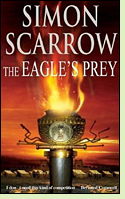The Eagle's Prey
by Simon Scarrow
Reviewed by David Maclaine

The Eagle's Prey, fifth in the "Eagle" series, completes Scarrow's treatment of the military campaigns that brought Britain into the Roman Empire. Despite steady victories, the legions are still plagued by resistance led by the British chieftain Caratacus. In this installment a new operation is underway which may just succeed in trapping Caratacus and his army and bringing the campaign to a conclusion. Unfortunately, Cato and Macro, the odd-couple protagonists of the series, both now centurions, find that the inexperienced commander of their Third Cohort complicates the task given their Second Legion to block the fords of the River Tamesis. The politics of life in the army are not always the fairest, and Cato finds himself condemned to death, a scapegoat for his commander's failure. This being an adventure-fiction series, we are in no real doubt that he will escape that fate, and it's not too hard to guess the broad outlines of how he will redeem himself.
But if the plotline of The Eagle's Prey delivers a bit less suspense than the earlier novels in the series, the big battle scenes continue to deliver Scarrow's now-expected level of excitement. The only real let-downs are a couple of lapses in the author's grasp of hydrology. I'm pretty sure that the simple geometry of volumes makes it unlikely that you'll find a ford at a point where a "river narrows," and that, if you bisect a large marshy area with a "valley," you will end up with a stream rather than a dry track on which armies can travel and fight. But aside from those lapses, Scarrow shows his usual command, with tightly written action sequences that show his detailed understanding of how a Roman army waged war. The conclusion of the important British campaign means this is the last of the "Eagle" series novels to make my list of "Best Historical Novels for a Survey of Ancient Roman History," but fans of military fiction will want to read on. (2005, 306 pages)
More about The Eagle's Prey at Powell's Books or Amazon.comThe Eagle's Prey appears on the list of The 50 Best Historical Novels for a Survey of Ancient Roman History
Other novels about the struggle between Caratacus and the Roman army:
The Dark Island by Henry Treece (1952; titled The Savage Warriors in the U.S.), about the Roman defeat of Caratacus. More info
Claudius by Douglas Jackson (2009), about Caratacus and the keeper of the elephant Emperor Claudius brings to Britain to strike fear into its defenders. More info
Nonfiction about Caratacus and the Roman conquest of Britain:
Rome Against Caratacus by Graham Webster (revised edition, 1993). More info
Invasion: The Roman Conquest of Britain by John Peddie (1987). More info
The Coming of Rome by John Wacher (1979). More info
Online:
Caratacus at Penelope.uchicago.edu
Back to Novels of Ancient History
Back to Directory of Book Reviews